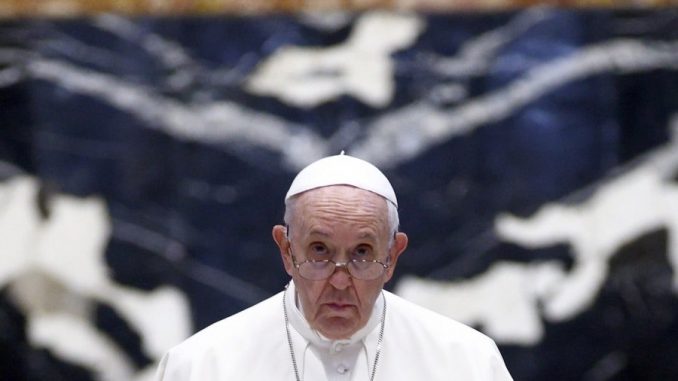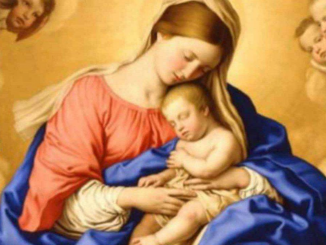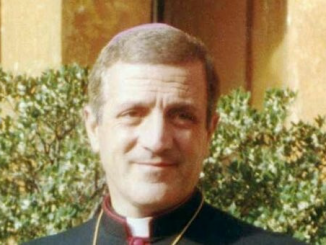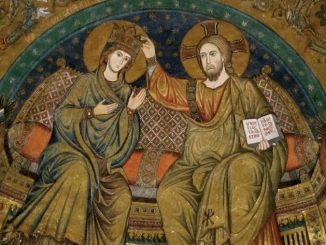
Francis, unfortunately, will not be remembered as a great reforming Pope, no matter how hard he tries to avoid sinking the Barque of Saint Peter. One can only feel sorry for a captain who asks his crew to save a vessel in the storm but drills one hole after another on the floor of the ship, thinking “she’ll be right”. His crew, however, is no better.
For someone who has changed three Directors of his Press Office in the last five years and even issued an app that gives priest model Sunday homilies quoting from his speeches, Francis still lacks the depth of love that thousands of Catholic faithful have towards an apparently cold, Teutonic and frail Benedict XVI. For this reason, perhaps, the Papacy of Pope Francis has never been an easy one. It continues to exist behind the shadow of a living giant who from the other side of the Vatican Gardens stirs the consciences of the entire Catholic world just by keeping silent.
If Francis still wishes to be remembered as an inclusive, modern, welcoming and unifying Pope, the publication of his latest motu proprio ‘Traditionis Custodes’ is the antipodean of all that he has seemingly stood for since his election in 2013. In light of this new decree, which severely restricts for the present and into the future the celebration of the Traditional Latin Mass, why would a faithful Catholic support the view that Bishops should ask the government not to restrict worship during the pandemic, when the Church herself enforces restrictions to worship from within? This is precisely the great paradox of the Spirit of Vatican II, a hypocritical interpretation and filtering of the real intentions of the Church Fathers, which seeks uniformity not for the sake of nurturing the natural growth of the Bride of Christ in its variety of liturgical expressions but for the purpose of alienating of a portion of the People of God on the assumption of a progressive versus conservative dichotomy.
The recent laws imposed by Pope Francis place restrictions to the celebration of the Mass according to the Rite contained in the Roman Missal approved by Saint John XXIII. This last revision of the rubrics for celebrating the Mass in 1962 was part of a largely unchanged way of offering the Catholic Mass since the time of Saint Pius V and the Council of Trent, over 500 years ago.
In 1970, a perhaps misguided idea that Catholics and Protestants could worship together in the same liturgy, pushed the Holy See to amend the Catholic Mass by stripping many of its key liturgical components. In this way, the changes would render it acceptable to those Christians in Western Europe who had over earlier centuries separated themselves from the Church of Rome as a result of the political, lucrative or carnal perversions of their secular rulers to feel a sense of Christian unity and ecumenical renewal. The result was instead that in the 1980s and 1990s, the banality and profanity of protestant gatherings filtered into the Catholic Church and the way the Mass of Saint Paul VI came to be celebrated. For what is worth, Paul VI’s writings often speak of how troubled the Pope was by Bishops and priests who rejected even the very basic idea that saying Mass implied upholding the worthiness of a sacred rite.
In 2007, Pope Benedict XVI introduced a motu proprio ‘Summorum Pontificum’ which liberalised the 1962 Mass and granted every priest the right to offer it according to some basic principles of competence and knowledge, without the need to seek permission from their Bishop. Benedict XVI hoped that this move would help on one side increase the quality of Masses being offered worthily and with dignity while on a broader scope to help restore a working unity with the Society of Saint Pius X. Many young people have certainly grown fond of Benedict and desire genuine beauty in the liturgy so it is expected that liturgies will continue to remain solemn in the years to come, but the expected result of regularising the status of the Lefrevians did not eventuate.
While the liberalisation of the 1962 Mass caused some concerns with respect to priests who would offer a Mass and then be transferred to another parish, thus leaving groups of faithful without continuity of the Mass, many parishes took up the opportunity to offer a Latin Mass as part of a regular schedule and were able to draw the interest of young people particularly those who were heavily dissatisfied with the way in which a handful of baby boomers controlled the daily affairs and liturgical life of a parish, at the sight of an impotent priest who remained in-charge only on the books.
There was also another issue, and here Pope Francis has a point. Going to a Traditional Latin Mass often became a breeding ground for radicalism, isolation from the Universal Church, rigidity and questioning some of the more liberal teachings of the Church, particularly the ambiguity of Vatican II documents. Now, I don’t wish to bore out the reader by repeating that Vatican II was a pastoral Council and its intentions were not to add anything more or new to the deposit of the faith than what the Church had already defined, but the stubborns will disagree with this truth so it is better to just take the Council for a turning point in the history of the Catholic Church and move on. Most importantly, the 1970 Mass was not the result of the work of Vatican II but of a new commission set up by the Holy See. The actual ‘Mass of the Council’ was a short-lived liturgical form celebrated according to an interim 1965 version of the Roman Missal. In 1970, Paul VI approved yet another form of the Mass which imported a number of foreign elements in the liturgy such as the offertory ‘Blessed are you Lord of All Creation’, an absolute novelty taken from a Jewish thanksgiving prayer.
Nevertheless, due to a revisionist approach to Vatican II, a strong sense of distaste for Bishops has grown among many traditional groups so that at least, through this Motu Proprio, Pope Francis has stepped in to help out a wide number of incompetent and inadept Ordinaries who found it too difficult to carry out their supervisory duties and invest in the care for unity mandated by ‘Summorum Pontificum.’ Benedict had hoped that his crew would be willing and able to patch the holes of the Barque should they appear… He was mistaken.
Traditionis Custodes states that “the liturgical books promulgated by Saint Paul VI and Saint John Paul II, in conformity with the decrees of Vatican Council II, are the unique expression of the lex orandi of the Roman Rite.” Other than the word ‘unique’ being an odd translation of the Italian “unica” as different from “sola”, the new norm declares that the 1962 Missal is no longer part of the true faith worshipped through the Roman Rite. How does this compare to the Anglican Use or the Zaire Use and why couldn’t a textually well-drafted law (which this is not) have absorbed those aspects of the 1962 Missal which are dear to the faithful who attend such an expression of the same Roman rite and establish a Tridentine Use? These are questions of piety and practice beyond the scope of Traditionis Custodes which unfortunately addresses primarily issues of politics.
The motu proprio appears harsh in the language used while equally displaying a sense of rush and ambiguity in its drafting. It leaves open questions such as the future of the Priestly Fraternity of Saint Peter or the Institute of Christ the King Sovereign Priest, the former comprising priests who had left the Lefrevians to be in full communion and regular canonical status with the Holy See in 1988. It clearly states that Latin Masses will not be allowed in parishes so they will more and more become ‘hidden’ and quasi-clandestine in nature. This subsequently runs the risk of priests offering Mass in private, without permission and of deeper divisions in the Catholic Church.
Traditionis Custodes does something even more concerning, though. It impacts on the formation of future priests, who will require a special approval by their Bishop and in consultation with the Holy See to celebrate Mass according to the 1962 Missal. From this point forward, therefore, is there any reason for including the teaching of the Extraordinary Form in the curriculum for priestly formation? Perhaps not, since Francis assumes that Benedict was wrong to even think that there was such a thing as an Extraordinary Form of the Roman Rite as this was not in line with the post-Conciliar developments. Moreover, the Pope wishes to include all faithful in the “unity of one, single Rite” however this seems at odds with the Conciliar document Sacrosanctum Concilium stating that “even in the liturgy, the Church has no wish to impose a rigid uniformity.” Where is the consistency, one would ask? The purpose of this motu proprio, therefore, is not the liturgy. It stems from a much older issue within the Catholic Church, that is, the inability of Bishops to exercise care and discipline in their Diocese when it comes to worship. Widespread incompetence has been turned into an issue of worship and channeled to the Holy See. When it takes effort to do something, especially in the liturgy, just get rid of it!
Pope Francis’ justification for introducing these new rules comes as a result of a survey sent to all Bishops in 2020 asking for feedback on Summorum Pontificum. Readers in Australia can cast their mind to another Survey, held in 2017. The government introduced a survey to feel the pulse of the nation on the topic of Same Sex Marriage, and let’s just say that it wasn’t the most civilised experience of unity in Australian history. How much synodality and active participation of lay people went into the survey on Summorum Pontiticum? Very little, and the result has been the issuing of one of the most centralising norms the Vatican has seen since the time of Pius IX.
Since 2007, the Latin Mass has been a sensitive topic. Note, for instance, the embarrassing title used by Vatican News in their article announcing the promulgation of Pope Francis motu proprio: “New norms regarding use of 1962 Roman Missal: Bishops given greater responsibility.” Here the Press Office used a set of carefully crafted, neutral and indifferent words to ensure that such suppressive norms would not resonate with everyday Catholics. It cannot compare to another article published a few days earlier which reads: “Pope Francis: Don’t throw plastic in the sea!” This news is so important that it requires an exclamation mark, in case you haven’t noticed.
If some Bishops had spent less time sending memes to priests and more time leading and spending themselves for the Church by visiting the groups and parishes to foster the unity auspiced by Benedict XVI in Summorum Pontificum while openly correcting the “unbearable distortions” which lead to liturgical abuse in the Novus Ordo, we might have had a different Motu Proprio. To a Franciscan Friar who said that the new Motu Proprio “gets rid of those who want the Latin Mass but don’t understand Latin”, my reply was that “the Church has seen persecutions and popes of all kinds and the Lord will know how to give each one of his Vicars on earth the eternal judgment they deserve. Pax et Bonum.”
Perhaps this will now be a time to watch those live streams and write a letter of complaint to the Bishop every time an “unbearable distortion” or an abuse of the liturgy appears. For a decade, the youth of the Church have been able to witness the Extraordinary Form and have pushed to import into the Ordinary Form many of its elements of beauty, reverence and transcendence. Now, everyone will be able at least to quote Pope Francis and remind Bishops to pull the finger out of their back side and be those attentive Guardians of the Tradition that this Pope has asked them to be.




Be the first to comment